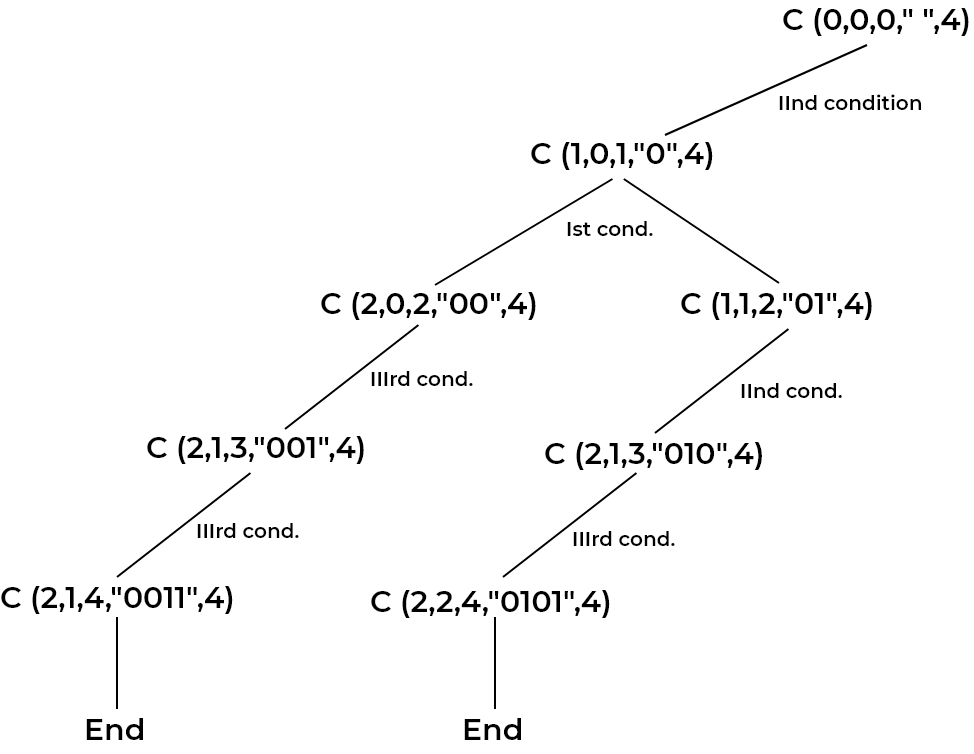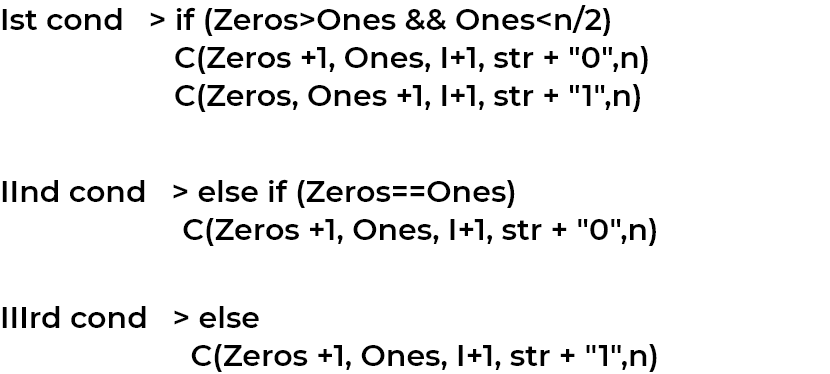Last Updated on March 23, 2022 by Ria Pathak

CONCEPTS USED:
Recursion
DIFFICULTY LEVEL:
Hard
PROBLEM STATEMENT(SIMPLIFIED):
Given
Npairs of Binary Numbers0and1, your task is to generate all possible combinations such that for each0there should be a corresponding1in the combination not vice versa. In simple words for every0on the left there should be a1on the right."
0011" is a valid combination as for both zeros there are two1'spresent in the right."
0110" is not a valid combination as there is a1for the first0but no1is present for the last0on its right.
See original problem statement here
For Example :
N = 1
Output : 1
Explanation :
All possible combination of pair 1 = "01", but "10" is not a valid pair as there is no valid 1 for 0 on the right of it.N = 2
Output : 2
Explanation :
All possible combination of pair 2 = "0011", "0101"
Notice here that for every 0 on the left there is a 1 on the right.OBSERVATION:
The problem becomes simple to understand if consider
0as left bracket "(" and 1 as right bracket ")".Now we just need to balance these brackets in all possible ways.
For
N = 3, such possible combinations can be:
((())),
(()()),
(())(),
()(()),
()()()
Can we use Recursion here ?
Yes,
Recursionseem to be a great option whenever we need to find different combinations.
SOLVING APPROACH:
We will follow a recursive approach to solve the problem.
Initialize an empty string
Str = ""for keeping our resultant string.Initialize
Zeros,Onesfor number of zeros and ones, both set to0initially.Keep
i = 0for tracking on which index we are currently on, whenever we reachi = N, this implies we have processed the entire string of lengthN, just print theStrand return.On each recursive call, check if
Zeros > OnesandZerosis less than half ofN, this implies thatZerosis more in number in the current string and also some0‘s still remain for getting into the string, in this case, we can either add0or1to the current stringStr, incrementiby1and incrementZeros/Onesby1whoever added.Else if
Zerosis equal toOnes, we can only add0toStr, incrementiandZerosby1.Else
(when all zeros are used / zeroes are in majority), we can add1toStrand incrementOnesandiby1.
STATE SPACE TREE:


SOLUTIONS:
#include <stdio.h>
#include <string.h>
/* function for appending a char to a char array */
void append(char* s, char c) {
int len = strlen(s);
s[len] = c;
s[len+1] = '\0';
}
//function generating all such combinations
void generatePairs_0_1(int n, int zeros, int ones, char *ans, int i){
// when i becomes equal to string length print the string
if(i == n){
printf("%s ", ans);
return ;
}
/* creating temporary char arrays */
char temp_0[30];
char temp_1[30];
/* copying original char array to temp arrays */
strcpy(temp_0, ans);
strcpy(temp_1, ans);
/* append char i to char array str */
append(temp_0, '0');
append(temp_1, '1');
/*when zeros are greater than ones in the left and half of the
zeros are not filled we can either add 0 or 1 to the string */
if((zeros > ones) && (zeros < n/2)){
generatePairs_0_1(n, zeros + 1, ones, temp_0, i+1);
generatePairs_0_1(n, zeros, ones + 1, temp_1, i+1);
}
/*when zeros are equal to ones, we can only add 0 zero to the string */
else if(zeros == ones){
generatePairs_0_1(n, zeros + 1, ones, temp_0, i+1);
}
/*when zeros are greater than ones but have already been
filled in half of the string, we can now add remaining 1's*/
else
generatePairs_0_1(n, zeros, ones + 1, temp_1, i+1);
}
int main()
{
int n; scanf("%d", &n);
char ans[30] = "";
generatePairs_0_1(n*2, 0, 0, ans, 0);
return 0;
}
#include <bits/stdc++.h>
using namespace std;
//function generating all such combinations
void generatePairs_0_1(int n, int zeros, int ones, string str, int i){
// when i becomes equal to string length print the string
if(i == n){
cout<<str<<" ";
return ;
}
/*when zeros are greater than ones in the left and half of the
zeros are not filled we can either add 0 or 1 to the string */
if((zeros > ones) && (zeros < n/2)){
generatePairs_0_1(n, zeros + 1, ones, str + "0", i+1);
generatePairs_0_1(n, zeros, ones + 1, str + "1", i+1);
}
/*when zeros are equal to ones, we can only add 0 zero to the string */
else if(zeros == ones){
generatePairs_0_1(n, zeros + 1, ones, str + "0", i+1);
}
/*when zeros are greater than ones but have already been
filled in half of the string, we can now add remaining 1's*/
else
generatePairs_0_1(n, zeros, ones + 1, str + "1", i+1);
}
int main()
{
int n; cin>>n;
generatePairs_0_1(n*2, 0, 0, "", 0);
return 0;
}
import java.util.*;
import java.io.*;
public class Main {
static void generatePairs_0_1(int n, int zeros, int ones, String str, int i){
// when i becomes equal to string length print the string
if(i == n){
System.out.print(str + " ");
return ;
}
/*when zeros are greater than ones in the left and half of the
zeros are not filled we can either add 0 or 1 to the string */
if((zeros > ones) && (zeros < n/2)){
generatePairs_0_1(n, zeros + 1, ones, str + "0", i+1);
generatePairs_0_1(n, zeros, ones + 1, str + "1", i+1);
}
/*when zeros are equal to ones, we can only add 0 zero to the string */
else if(zeros == ones){
generatePairs_0_1(n, zeros + 1, ones, str + "0", i+1);
}
/*when zeros are greater than ones but have already been
filled in half of the string, we can now add remaining 1's*/
else
generatePairs_0_1(n, zeros, ones + 1, str + "1", i+1);
}
public static void main(String args[]) throws IOException {
Scanner sc = new Scanner(System.in);
int n = sc.nextInt();
String res = "";
generatePairs_0_1(n*2, 0, 0, res, 0);
}
}
def generatePairs_0_1(n, zeros, ones, str, i): if(i == n): print(str, end = " ") return if((zeros > ones) and (zeros < n//2)): generatePairs_0_1(n, zeros + 1, ones, str + "0", i+1) generatePairs_0_1(n, zeros, ones + 1, str + "1", i+1) elif(zeros == ones): generatePairs_0_1(n, zeros + 1, ones, str + "0", i+1) else: generatePairs_0_1(n, zeros, ones + 1, str + "1", i+1) n = int(input()) generatePairs_0_1(n*2, 0, 0, "", 0)
[forminator_quiz id="1134"]
Space Complexity:
O(N)The space complexity can be reduced to
O(N)ifGlobalvariable orStaticvariable is used to store the output string.
Refer Video for Quick Explaination:
This article tried to discuss Recursion. Hope this blog helps you understand and solve the problem. To practice more problems on Recursion you can check out MYCODE | Competitive Programming.



